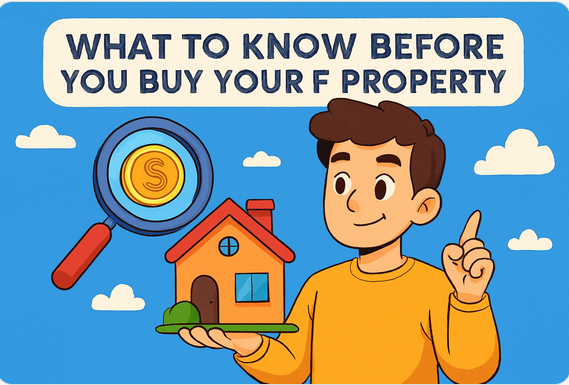Here are some things to know before you purchase your first property. Because, of all the milestones in adult life, few are as exhilarating and terrifying as buying your first home. It’s a powerful declaration of independence and a cornerstone of financial stability. Yet, the process is a labyrinth of high-stakes decisions where emotion and logic often collide.
This guide is designed to be your comprehensive roadmap. We will move beyond the basics to explore the critical, often overlooked factors that separate a wise investment from a costly mistake, ensuring you embark on this journey with confidence and clarity.

About To Buy A Home? Make Sure You Know These:
Part 1: The Financial Blueprint – How Will You Pay?
Before you fall in love with a property, you must have a ruthless understanding of how you will pay for it. The chosen method will dictate your budget, your negotiating power, and your long-term financial planning. It may even determine your lifestyle for the considerable future.
Option A: The Mortgage Path
The vast majority of first-time buyers in developed countries finance their purchase with a mortgage, a loan secured by the property itself. The mortgage market in Nigeria is undeveloped, and currently out of reach for most people. Nevertheless, it is worth learning about.
Benefits:
Leverage: You control a large asset (the house) with a relatively small initial investment (the down payment). This allows you to build equity as the property appreciates.
Preserves Liquidity: You don’t tie up all your capital in one illiquid asset, leaving you with cash for investments, emergencies, or home improvements.
Forced Savings: A mortgage payment acts as a disciplined monthly savings plan, steadily increasing your ownership stake.
Potential Tax Advantages: In some countries, mortgage interest and property taxes may be tax-deductible.
Disadvantages:
Long-Term Debt: You commit to a decades-long financial obligation, which can feel burdensome.
Significant Interest Cost: Over the life of the loan, you will pay a substantial amount in interest, often exceeding the original principal.
Additional Costs: Mortgages come with closing costs (2-5% of the loan value) and often require you to pay for Private Mortgage Insurance (PMI) if your down payment is less than 20%.
Risk of Foreclosure: If you fail to make payments, the lender can seize the property.
Option B: Pay With Cash
Paying for a property outright with cash is the most common way of purchasing property in the country, and rightly so because it offers a distinct set of advantages and drawbacks.
Benefits:
Supreme Negotiating Power: A cash offer is king. Sellers favor them because they are guaranteed, faster (no loan underwriting), and have no risk of falling through due to financing issues. This often allows you to secure a property for a lower price.
No Interest Payments: You avoid paying tens or hundreds of thousands of dollars in interest to a bank.
Total Ownership and Peace of Mind: You own the home free and clear from day one, with no monthly mortgage payment, providing immense financial and psychological security.
Simpler, Cheaper Closing: Without a lender involved, the closing process is streamlined, and you avoid many associated fees.
Disadvantages:
Ties Up Capital: You concentrate a massive amount of your wealth into a single, non-liquid asset. This money is then unavailable for other investment opportunities that might offer higher returns.
Reduced Liquidity: Your emergency fund and accessible cash are significantly depleted, which can be risky if a major financial setback occurs.
Opportunity Cost: The money used to buy the house could have been invested elsewhere in a diversified portfolio.
The Verdict: For those who have good jobs, especially with the government, a mortgage is the smartest way to buy property in the country. However, if you have the means to pay cash, it’s a strategic decision that weighs the safety and negotiating power of cash against the potential for greater wealth generation through leveraged investing.
Part 2: Location, Location, Location
You can renovate a kitchen, but you cannot move your house away from a flood zone or a high-crime area. The location is the most critical determinant of your quality of life and the property’s long-term value.
Pay Attention To The Environment and Infrastructure:
Flooding and Drainage: This is non-negotiable. Check FEMA flood maps, but also talk to neighbors and visit after a heavy rain. You can even use google; search if there is a history of flooding in the area. Then look for water stains in basements, poorly graded yards that slope towards the house, and signs of erosion. Flood insurance is almost non existent in the country, and where it exists, it can be prohibitively expensive.
Quality of Roads and Access: Are the roads well-maintained? Is there easy access to major highways or public transportation? A long, poorly maintained private road can mean costly repairs for you and deter future buyers.
Proximity to Nuisances: Is the property under a flight path? Is it near a train track, a busy highway, a factory, or a farm with strong odors? What seems tolerable on a single viewing can become a daily source of stress.
Security and Community:
Crime and Safety: Research local crime statistics. Go beyond the data—visit the neighborhood at night and on weekends. Does it feel safe? Are there people walking their dogs, or are curtains drawn and doors barred? Well-lit streets and active neighborhood watch programs are positive signs.
School Districts: Even if you don’t have and never plan to have children, the quality of local schools has a direct and powerful impact on property values. Homes in top-rated school districts appreciate faster and are more resilient during market downturns.
Future Development: Investigate the local planning and zoning department. Is a new shopping center, school, or highway planned nearby? While some developments are beneficial, others can increase traffic, noise, and fundamentally alter the character of the neighborhood.
Part 3: The Building Itself – Looking Beyond the Paint
A fresh coat of paint and clever lighting effects can hide a multitude of sins. Your job is to see through the smoke, and to assess the true quality and condition of the structure. We can’t blame the agent for trying, he has to close sales to earn money. But you are not a sucker!
The Home Inspector is Your Best Friend: Never, ever waive the inspection contingency. Hire your own certified, reputable inspector—don’t just use the one recommended by the selling agent.
Focus on these Items:
Foundation cracks, roof age and condition, and the structural integrity of walls and floors.
The Systems: Electrical wiring (is it outdated and unsafe?), plumbing (what material are the pipes? Are there signs of leaks?), and the AC system (how old is the furnace and air conditioner?).
Windows (are they old and drafty?), What about the insulation levels, and siding condition. These directly impact your utility bills and comfort.
Consider Layout and Future Needs: Is the floor plan functional for your lifestyle? Is there potential to add value through a renovation (e.g., finishing a basement, adding a bathroom)? Think about resale: a house with three bedrooms and one bathroom is harder to sell than one with two bathrooms, regardless of its charm.
Part 4: The Exit Strategy – How Easy Will It Be to Sell?
You are not just buying a home; you are making an investment that you will one day need to liquidate. Thinking like a future seller from the very beginning is a hallmark of a savvy buyer.
Assess the Property’s “Liquidity” in the Market:
Curb Appeal and First Impressions: Does the house have what agents call “good bones” and instant appeal? A unique or quirky house might be your dream, but it will have a smaller pool of potential buyers when you sell. A property that is overly personalized (e.g., neon pink walls, overly specific themed rooms) may be harder to move.
The Price Point: Is the home priced within the median range for its area? The most liquid properties are those that are affordable to the largest segment of the market. The most expensive house on the block is often the hardest to sell.
Addressing Known Flaws: If you buy a house on a busy road, know that you will also have to sell a house on a busy road. If you buy a house with only one bathroom, you are targeting buyers comfortable with that. Understand the inherent limitations of the property and be confident you can live with them—and eventually sell them to someone else.
Factors That Ensure a Faster Sale:
Strong Location: As discussed, a great location is the ultimate selling feature.
Good Condition: A well-maintained home with completed ( or updated) major systems (roof, HVAC) will always sell faster than a “project.”
Desirable Amenities: Features like a second bathroom, a garage, outdoor space, and in-unit laundry are consistently high on buyers’ lists.
Conclusion
Buying your first property requires you to look at every potential home through multiple lenses simultaneously: the heart of a resident, the spreadsheet of an accountant, the keen eye of an inspector, and the foresight of a strategist.
By meticulously planning your financing, conducting ruthless due diligence on the location and building quality, and always keeping one eye on the future resale prospects, you transform this daunting process from a emotional one with potential for high BP, into a strategic, managed project that brings rich rewards. This disciplined approach ensures that the moment you finally hold the keys, you are not just holding the title to a house, but the foundation for a secure and prosperous future. Welcome home.


